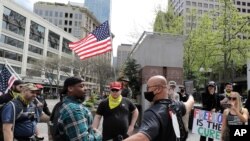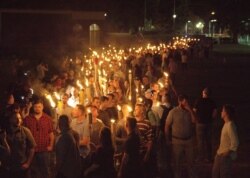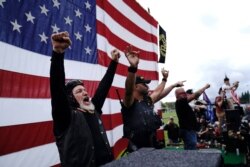President Donald Trump on Thursday denounced all extremist groups, including the right-wing, pro-Trump Proud Boys, following growing criticism over his apparent refusal to condemn white supremacy during Tuesday’s presidential debate.
"Let me be clear again,” Trump told conservative Fox News host Sean Hannity. “I condemn the KKK. I condemn all white supremacists. I condemn the Proud Boys. I don't know much about the Proud Boys, almost nothing, but I condemn that."
Trump made the comments just hours before his shocking revelation that he and first lady Melania Trump had tested positive for the coronavirus after a close White House aide, Hope Hicks, had contracted the virus.
This is not the first time Trump has condemned white supremacists, many of whom support his presidency. Twice in 2017, Trump denounced white supremacists, neo-Nazis, and other hate groups after facing criticism for blaming “both sides” for violence at a far-right rally in Charlottesville, Virginia.
The president’s latest condemnation of white supremacy followed similar accusations of equivocation. The controversy erupted after Trump was asked during Tuesday night’s presidential debate by moderator Chris Wallace of Fox News if he would condemn white supremacy.
“Who would you like me to condemn?” Trump asked before Democratic challenger Joe Biden mentioned the Proud Boys.
“The Proud Boys? Stand back and stand by,” Trump responded. “But I’ll tell you what — somebody’s got to do something about antifa and the left, because this is not a right-wing problem. This is a left-wing problem.”
In his interview with Hannity, Trump said Biden should also condemn antifa. The former vice president recently said he condemns antifa and “violence across the board.”
The Proud Boys are among Trump’s most ardent supporters and frequently appear at his campaign rallies. Although the group publicly disavows racism, anti-Semitism and white supremacy and is not considered a white supremacist group, it has known ties to the broader far right movement and is designated by some as a hate group.
In a statement to VOA, Ronald D. Coleman, an informal spokesman for the Proud Boys, said on Friday: "The President acknowledges that he doesn't know anything about the Proud Boys, but everyone agrees he knows a lot about politics and the press. His statement makes perfect sense based on what he knows, and his supporters understand that.”
The Anti-Defamation League, which had demanded that Trump apologize over his comments, and the Southern Poverty Law Center, which designates the Proud Boys as a hate group, did not return requests for comment.
In response to Trump's debate-night comments, Enrique Tarrio, the Proud Boys’ Afro-Cuban leader, said on social media Tuesday that he did not see the remarks as a direct endorsement of his group. But others in the group and other far-right circles took them as a call to action.
“Trump basically said to go [expletive] them up!” Joe Biggs, a prominent Proud Boys organizer, on his Telegram channel. “This makes me so happy.”
In the wake of widespread criticism, Trump on Wednesday appeared to shift his stance, saying “I've always denounced any form of any of that you have to denounce."
But watchdog groups complained that Trump’s comments fell short of an explicit condemnation.
“It should not be this hard for @POTUS or any elected official simply to say the words, ‘I denounce white supremacy,’” Jonathan Greenblatt, CEO of the Anti-Defamation League (ADL), wrote on twitter on Thursday.
Brian Levin, executive director of the Center for the Study of Hate and Extremism at California State University, said Trump’s latest condemnation is unlikely to undo the damage done by his earlier comments.
“For his supporters in the white supremacy and extreme far right world, it is his vitriol that is taken as a call to action, and these late pronouncements are taken as forced, scripted and insincere,” Levin said.
The controversy comes as Trump continues to blame the violence at racial justice protests around the country almost exclusively on antifa, contradicting his own FBI director's assessment that violent white supremacy remains the biggest domestic national security threat.
The Proud Boys were started in 2016 as a drinking club of “Western chauvinists.” But extremism watchdogs say that is just a guise for what is at its core a misogynistic, anti-Muslim and anti-immigrant group.
Today the organization has chapters in most U.S. states, as well as in Australia, Britain and Norway, according to the ADL.
Last year, two Proud Boys members were convicted of assault and riot charges in connection with the beatings of antifa activists in New York City in 2018.
This year, members have participated in violent clashes between right-wing and left-wing activists in Portland, Oregon, and several other U.S. cities. On August 22, they fought with left-wing counter-protesters in Portland, engaging in multiple acts of violence, according to the ADL.







